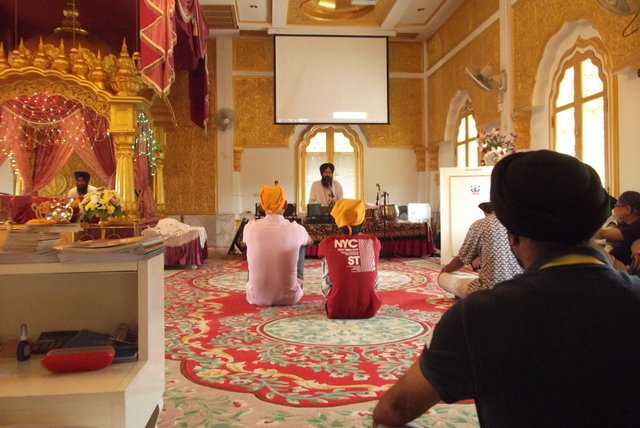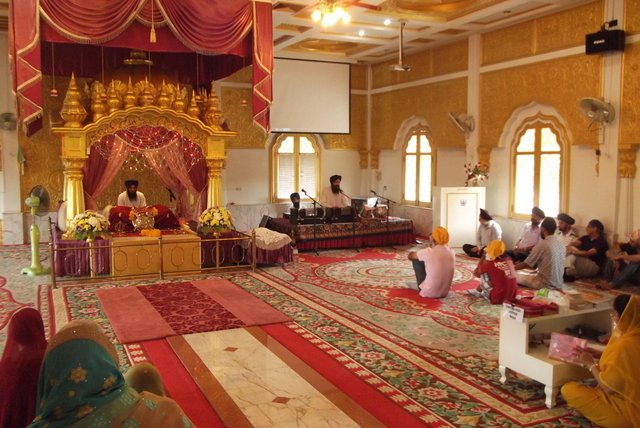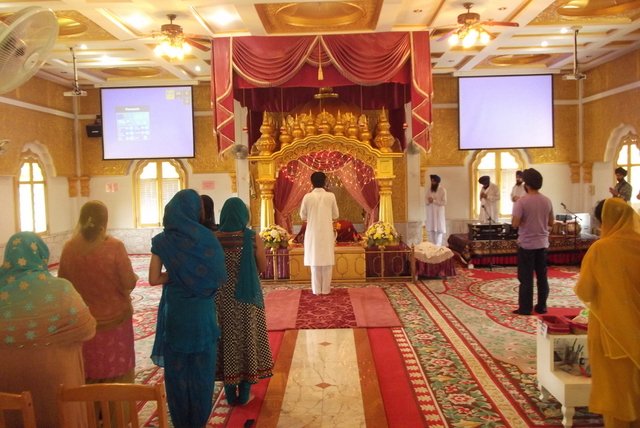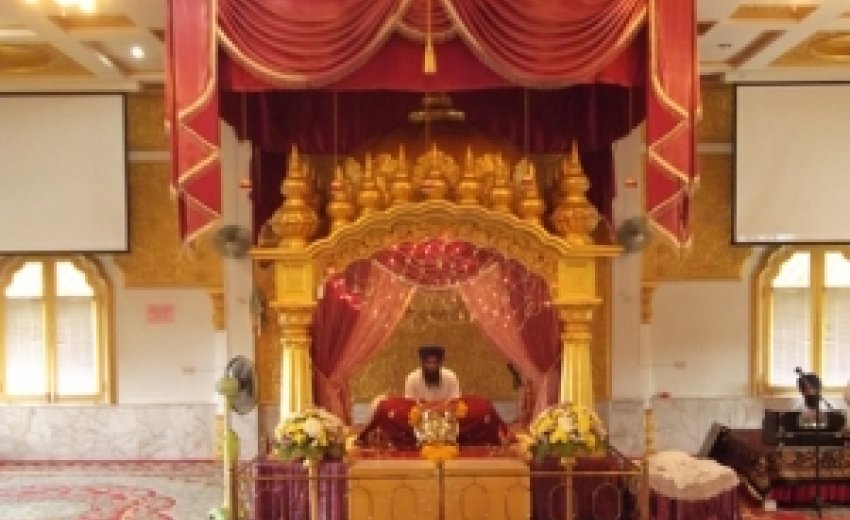
Besides the currency in which devotees donate money, pretty much everything else resembles a traditional Indian Sikh service at the Gurdwara Sikh temple in Phuket Town.
Although the main prayer service officially runs from 10am to 1pm every Sunday, worshippers tend to drop in at will, and the occasion seems to be as much about being seen to be seen amongst Phuket’s Sikh community as it is about paying respect to the tenants of their religion.
As is quite common with religion and its many different incarnations, to the unaccustomed, practices seem odd, foreign and well... just different.
AT HOME IN THE TEMPLE
In stages throughout the service, there are intervals of musical performances and chanting sessions performed by Ragis (musicians) between readings of the Guru Granth Sahib (religious text of Sikhism) by the official Granthi (the reader of the Sikh scripture).
Attendees at the Sikh service are divided according to their gender, with the women sat on the left side of the room and the men on the right side. In the middle sits a woman who collects and logs the donations. They face a colourfully decorated raised platform that contains a man who waves the “Chaur Sahib”, the fan used as a sign of reverence and respect for the Holy Scripture, and is a form of service.
A bearded young man, complete with an Arsenal Football Club bandanna, enters the third floor temple – via the lift – walks to the middle of the prayer hall, bows, turns on his heel, walks to the woman taking donations, gives her B100 and then exits, via the lift. He’s there for only one minute, at the most.

His actions elicit a few glances from the older generation, but his actions are valid as he, like any other present, is a member of the approximately 40 Sikh families currently living in Phuket.
Attendees are varied in terms of ages, yet sit around and relax together indiscriminately. Many are third-generation Thai-Indians and as such live – despite only a generation or two difference – much different lives than their predecessors.
The younger Indians are the ones who are much more moderate, yet there are still exceptions with some who follow Sikhism much more strictly than others.
Sikhs who have made a public commitment to the faith by going through a special baptism, known as the Amrit Ceremony, are called members of the Khalsa (the community of baptised Sikhs). They adopt five symbols. These symbols (the Five K’s) are not only a means of showing the Sikh identity, but they also have spiritual meanings and are powerful symbols of the faith.
The five Ks refer to the 5 items that every Sikh should possess with him/her at all times. They are Keshas (long and unshorn hair), Kangha (a comb), Kara (steel bracelet), Kachha (pair of shorts) and Kirpan (sword).
An attendee reclines while sipping his sweet, hot tea and smiles, “Sikhs are also supposed to pray three times a day, the first of which is at 4am, but we are Phuket people so people typically pray whenever they wake. In our family, it’s whoever gets up first: usually at about 7 or 8 am.
“And although one of the main tenants of Sikhism is to refrain from alcohol and other intoxicants, some Phuket Sikh men do sometimes indulge in a social drink.
SIKH-ING AN IDENTITY
Many Phuket Sikhs are in the tailoring business. Other popular professions include the hospitality industry, real estate or like Sharan Singhsachabula, a talkative young Sikh in attendance on Sunday, the selling of jewellery in his Patong-based shop.
Sharan’s grandparents came to work in the Phuket tin mines via Chiang Mai in 1947, his story echoing many Indians’ of that time.
“They came for a better life. After India gained independence in 1947, a lot of Indians left looking for a better life.”
A consequence of India’s independence was the subsequent splitting of ‘British India’ into Indian and Pakistani territories. Relations between the two have been strained by numerous political and historical conflicts ever since. In response to whether such animosity exists in Phuket between the two peoples as it quite often does in other countries where the two communities reside, Sharan says, “When our people left either before or at that time it was all India, so we are all Indian.”

“Anyway that is politics of the land and not the people. Furthermore we are Thai.”
However despite Sharan’s feelings, identity is a reoccurring issue and perplexing for Sharan.
“We have a Thai mentality, but when we are here they see us as Indian, and when we go to India they know almost straight away that we are not Indian. We have no real home,” says Sharan with a sardonic smirk.
But he is being sarcastic, because to the 50 or more attendees at the temple, eating, talking and laughing together, they are home and with family. The Gurdwara is clearly the focal point of the community and is more than a place of religion.
The upkeep, construction and recent renovation of the temple was all paid for by the local Sikh community, so they have every right to view it and regard it as home and an important place, not only spiritually, but culturally as well.
So how do Phuket Sikhs manage to maintain traditions and ensure that they carry on throughout successive generations? Within the community it is seen as incredibly important for the men to marry Sikh women, but with just 40 families on the island, isn’t that rather difficult?
Not for Sharan, who has been married for many years now, “I met my wife in Bangkok through friends and suggestions. Actually,” he continues, “We met on Facebook.”
Indeed times have changed quite dramatically since Sharan was a child, and there is every chance that his children will have much different lives than his.
“In the past and in my day I was sent to school in India because back then Thai education wasn’t what it is today. Nowadays Sikh families send their kids to international schools...”.
So although his children will not have to face the disruption of having to leave Phuket to complete formal education, Sharan believes that not all will be better about the succeeding generation of Phuket Sikhs.
“In some ways, it’s got a lot worse [for Sikhs] since 9/11. Bin Laden high-jacked the beard and turban. In India the beard and turban is usually the symbol of a good man, now it’s all changed.
He adds, clearly passionate, “Muslims here are a perfect example, they’ve been here for more than 200 years, but Thai people still call them Khon Kaak (a derogatory term for a Muslim of Southern Asian heritage).
“My experience is that Thai people think I’m Indian, but when they see me and then talk to me, they realise I am Thai with Thai experiences.”
FINDING A BALANCE
The balance between remaining true to one’s own heritage whilst taking steps to become integrated into a new ‘foreign’ country is one not without difficulties or intrinsic paradoxical problems.
‘Sara’ works in her family’s Phuket Town tailor shop with her Sikh father, mother and brother. But Sara, who is also third generation Indian, doesn’t feel very ‘Indian’ despite being educated there.
“I was born in Phuket but at 6-8 years old, I went to India to study. I remember it well; about a 100 Thai-born Indian children were taken to India via a tour agency. I would stay there for nine months at a time and then come back to Phuket for the three month holiday.”
Sara said that she continued in that vein until she was 16. In the three month intervals she said that she lost a lot of the language and as the classes were conducted in English, they were banned from speaking Thai.
After graduating, she returned to Phuket and opened up a clothes shop in Patong. However, the 2004 tsunami caused her to question her belief in Sikhism.
“I lost my clothes shop in Patong, it was completely destroyed. Like many of my work colleagues at that time I went to the temple, the Chinese temple. I also went to the Sikh temple, but something changed after the tsunami.”
Sara explained how after making the decision to no longer practice Sikhism and instead become Buddhist, her parents were at least initially a little angry.
“After the tsunami, I just didn’t feel enlightened by Sikhism, it just didn’t help in any way, but with Buddhism I liked meditating and gained a lot of peace from it.
“I found it very beneficial and now my parents see that I am 100 per cent committed to Buddhism, now it is okay.”
Despite her change in belief, Sara still lives in harmony with her parents under one roof. While issues of religious differences rarely come up, when they do – typically during Sikh and Buddhist festivals and events – rather than being a point of contention and tension, they are examples of how being tolerant, and keen to understand people’s differences, can ultimately bring people together.
There’s a lesson to be learned from that little tailor shop in Phuket town and one that doesn't necessarily require full attendance.

